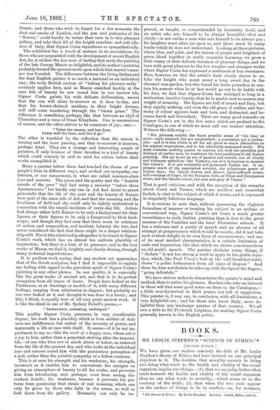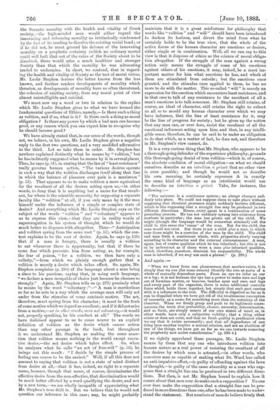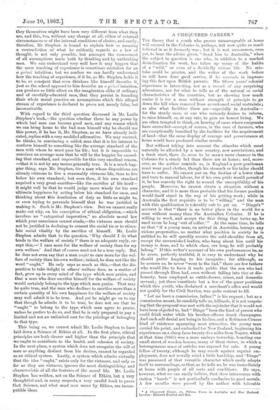BOOKS.
MR. LESLIE STEPHEN'S "SCIENCE OF ETHICS." [SECOND NOTICE.] WE have given our readers concisely the drift of Mr. Leslie Stephen's theory of Ethics, and have insisted on one principal objection to it. The doctrine that morality consists in being and doing what tends to the health and vitality of the sozial organism, implies two things,—(l), that we can judge better what tends towards the health and vitality of the social organism. than we can what tends to morality,—which seems to us the contrary of the truth ; (2), that when the two ends appear on the surface of things to be in conflict,—as, for instance,
• The Science of Ethics., By Leslie Stephen. London : Smith, Elder, and Co.
the Socratic morality with the health and vitality of Greek society,—the high-minded man would either regard the innovating and reforming morality as intrinsically condemned by the fact of its tending to dissolve the existing social bond ; or if he did not, he must ground his defence of the innovating morality on a prophetic certainty (which no ordinary mortal could well feel) that out of the ruins of the Society about to be dissolved, there would arise a much healthier and stronger Society than that which the morality he was advocating tended to undermine. In short, we contend, that in regard- ing the health and vitality of Society as the test of moral virtue, Mr. Leslie Stephen derives the better known from the less known, and further renders developments of morality which threaten, as developments of morality have so often threatened, the cohesion of existing society, from any moral point of view almost unintelligible and suicidal.
We must now say a word or two in relation to the replies which Mr. Leslie Stephen gives to what we have termed the fundamental questions of Ethics, namely,—Is there such a thing as volition, and if so, what is it Is there such a thing as moral obligation? Is there any power by which a bad man can become good, or any reason which you can expect him to recognise why he should become good ?
We have already stated that, in our sense of the words, though not, we believe, in his own, Mr. Leslie Stephen gives a negative reply to the first two questions, and a very modified affirmative to the third. Let us take them in order. Mr. Stephen has nowhere explained distinctly what he means by "volition," but he has indirectly suggested What he means by it in several places. Thus, he says (p. 51), in stating that the law of " leastresistance " really governs human action, "The various desires operate in such a way that the volition discharges itself along that line in which the balance of pleasure over pain is a maximum" (p. 51). That appears to us to make volition a mere equivalent for the resultant of all the desires acting upon us,—in other words, to deny that it is anything but a name for that result- ant, for where is the scientific necessity for supposing a separate faculty like " volition " at all, if you only mean by it the man himself under the influence of a simple or complex state of desire? And everything which Mr. Leslie Stephen says on the subject of the words " volition " and "voluntary" appears to us to express this view,—that they are in reality words of supererogation in his system of thought, which he would do much better to dispense with altogether. Thus—" Anticipation and volition spring from the same root" (p. 55), which the con- text explains to be the root of desire. Again, he says (p.159) that if a man is hungry, there is usually a volition to eat whenever there is opportunity, but that if there be some fear which prevents him from eating, as, for example, -the fear of poison, "for a volition, we then have only a velleity,"—from which we plainly enough gather that a volition is merely a desire which takes effect. So, again, Mr. Stephen complains (p. 286) of the language about a man being a slave to his passions, saying that, in using such language, "we declare a man incapable of choice just because he chooses so strongly." Again, Mr. Stephen tells us (p..271) precisely what he means by the word "voluntary :"—" A man is meritorious so far as he acts in a way which the average man will only act under from the stimulus of some extrinsic motive. The act, therefore, must spring from his character ; it must be the fruit of some motive which we regard as excellent; and if it did not arise from a motive,—or in other words, were not voluntary,—it would not, properly speaking, be his conduct at all." The words we -have italicised appear to us to come nearer to an explicit definition of volition as the desire which causes action than any other passage in the book, but throughout it we understand Mr. Stephen as making the same asser- tion that volition means nothing in the world except execu-
tive desire,—the net desire which takes effect. So, when he analyses what he calls "an act of free-will" (p. 53), he brings out this result : "I decide by the simple process of feeling one course to be the easiest." Well, if all this does not amount to saying that volition is not a state of mind distinct from desire at all,—that it has, indeed, no right to a separate name, because, though that name, of course, discriminates the effective desire from the non-effective, that discrimination would be much better effected by a word qualifying the desire, and not by a new term,—we are wholly incapable of appreciating what Mr. Stephen's true drift is. But we believe that he would not question our inference in this case ; nay, he might probably maintain that it is a great misfortune for philosophy that words like " volition " and "will" should have been introduced to darken its horizon, and divert the mind from what he certainly holds to be the true view, that the whole of the active forces of the human character are emotions or desires, either single or in combination. Well, all we can say to this view is that it disposes of ethics as the science of moral obliga- tion altogether. If the struggle of the man against a wrong action only means the straggle of some of his emotions against others of his emotions, it may, indeed, be a most im- portant matter for him what emotions he has, and which of them are stimulated from outside ; but the emotions once granted, and the stimulus once applied to them, he has no
more to do with the matter. This so-called " will " is merely an-
expression for the emotion which encounters least resistance, and in that case to talk of any resistance to the resultant of all a man's emotions is to talk nonsense. Mr. Stephen still retains, of
course, an ideal of character, still retains the right to exhort- us all so to mould any human character over which we may
have influence, that the line of least resistance for it, may
be the line of progress for society ; but he gives up the notion that any man can, or ever does, resist the resultant of all the-
emotional influences acting upon him, and that, in any intelli- gible sense, therefore, he can be said to be under an obligation to do that which, as a matter of fact, he does not, and therefore in Mr. Stephen's view cannot, do.
It is a very carious thing that Mr. Stephen, who appears to be- e thorough-going defender of the experience philosophy, grounds this thorough-going denial of tree volition—which is, of course,. the absolute condition of moral obligation—on what we should
ourselves describe as an intuition a priori that no other view is even possible ; and though he would not so describe- his own meaning, he certainly expresses it in exactly the same kind of language as an intuitionist would use- to describe an intuition, a priori. Take, for instance, the- following :— "The universe is a continuous system; no abrupt changes sud- denly take place. We could not suppose them to take place without supposing that identical processes might suddenly become different,. which is like supposing that a straight line may be produced in two- different directions. Hence, every agent is- a continuation of some- preceding process. He has not suddenly sprung into existence from nowhere in particular; the man has grown out of the child. We- might (though the language would be somewhat strained) call the child in this sense the cause' of the man. Bat for the child, the man would not exist. Bat there is not a child plus a man, in which. case there might be a coercion of the man by the child. The child and man form a continuous whole, with properties slowly varying- according to its character and the external circumstances. A man,. again, has of course qualities which he has inherited ; but this is not to be understood as if there were a man plus inherited qualities,. which, therefore, somehow, diminish his responsibility. The whole- man is inherited, if we may use such a phrase." (p. 289.) And again :— " When we know from one phenomenon that another exists, it is. simply that we can (for some reason) identify the two as parts of a whole of mutually dependent parts. From an eye we infer an ear- or a leg; it is not because the eye has a power to make ears and legs out of formless matter, or because, besides eyes and ears and legs and every part of the organism, there is some additional coercive force which holds them together, but simply that each part carries= with it a reference to the rest. The difficulty is dispelled so far as it- can be dispelled when we have got rid of the troublesome conception of necessity, SS a name for something more than the certainty of the observer. When we firmly grasp and push to its legitimate conse- quences the truth that probability, chance, necessity, determination,. and so forth, are simply names of our own states of mind, or, in other words, have only a subjective validity; that a thing either. exists or does not exist, and that no fresh quality is predicated when we say that it exists necessarily; and that all dependence of ons. thing upon another implies a mutual relation, and not an abolition of' one of the things, we have got as far as we can towards removing- the perplexity now under consideration." (p. 293-4.) If we rightly apprehend these passages, Mr. Leslie Stephen means by them that any one who introduces volition into- human nature as a real power of resisting the resultant of all the desires by which man is actuated,—in other words, who conceives man as capable of making what Dr. Ward has called an anti-impulsive effort,—is guilty of offending against the laws- of thought,—is guilty of the same absurdity as a man who sup- poses that a straight line can be produced in two different direc- tions. But then, is not Mr. Stephen bound to explain how it comes about that men ever do make such a supposition ? No one ever does make the supposition that a straight line can be pro- duced in more directions than one, after hehas been made to under- stand the statement. But numbers of men do believe firmly that they themselves might have been very different from what they are, and this, too, without any change at all, either of external circumstances or of the internal conditions of choice; and surely, therefore, Mr Stephen is bound to explain how so amazing a contradiction of what he evidently regards as a law of thought, is not only possible, but amongst the commonest of all assumptions made both by thinking and by unthinking men. We can understand very well how it may happen that the mere teaching of experience is sometimes mistaken for an 41 priori intuition; but we confess we can hardly understand how the teaching of experience, if it be, as Mr. Stephen bolds it to be, so constant that even thinkers like himself -describe it, just as the school opposed to him describe an a priori intuition, can produce so little effect on the imagination alike of ordinary and of carefully-educated men, that they persist in founding their whole moral practice on assumptions which this alleged stream of experience is declared to prove not merely false, but inconceivable.
With regard to the third question discussed in Mr. Leslie .Stephen's book,—the question whether there be any power by which bad men can become good men, and any reason which we can bring home to the bad man himself why he should use -this power, if he has it, Mr. Stephen, as we have already indi- -cated, replies with a very modified affirmative. We may suceeed, he thinks, in convincing a selfish man that it is his interest to -conform himself to something like the average standard of the men with whom he must pass his life ; but it is impossible to -convince an average man that he will be the happier for exceed- ing that standard, and impossible for this very excellent reason, —that it is not by any means generally true. It is a much hap- pier thing, says Mr. Stephen, for a man whose dispositions are .already virtuous to live a, reasonably virtuous life, than to live below his own standard; but even then, if his own standard required a very great sacrifice—like the sacrifice of life itself— it might well be that he would judge more wisely for his own ultimate happiness by acting below his standard for once, and -thinking about this dereliction of duty as little as might be, or even trying to persuade himself that he was justified in making it. Such is Mr. Stephen's view. But we cannot really make out why, on his conception of ethical obligation,—which involves no "categorical imperative," no absolute moral law which your conscience cannot evade,—the virtuous man should not be justified in declining to cement the social tie or to stimu- late social vitality by the sacrifice of himself. Mr. Leslie Stephen admits that to the question, 'Why should I do what tends to the welfare of society ?' there is no adequate reply, ex- cept I care more for the welfare of society than for my .own welfare.' And that of course need not be a true reply. But he does not even say that a man ought to care more for the wel- fare of society than his own welfare ; indeed, he does not like the word "ought." He only says as much as this,—that the dis- position to take delight in others' welfare does, as a matter of fact, grow up in every mind of the type which men praise, and that a man who does sacrifice himself for the welfare of society would certainly belong to the type which men praise. That may be quite true, and the man who declines to sacrifice more than a certain quantity of his own happiness for the welfare of society
may well admit it to be true. And yet he might go on to say that though he admits it to be true, he does not see that he " ought " to belong to the type, which men agree to praise, -unless he prefers to do so, and that he is only prepared to pay a limited and not an unlimited cost for the privilege of belonging to that type.
This being so, we cannot admit Mr. Leslie Stephen to have laid down a Science of Ethics at all. In the first place, ethical principles are both clearer and higher than the principle that
we -ought to contribute to the health and cohesion of society. In the next place, a system which does not recognise the will of
man as anything distinct from his desires, cannot be regarded as an ethical system. Lastly, a system which admits virtually that the idea "ought," exists only for the virtuous, and only so far as they are virtuous, ignores the most distinguishing and -characteristic of all the features of the moral life. Mr. Leslie Stephen has written, not on the Science of Ethics, but a very thoughtful and, in many respects, a very candid book to prove that Science, and what most men mean by Ethics, are incom- patible ideas.






































 Previous page
Previous page